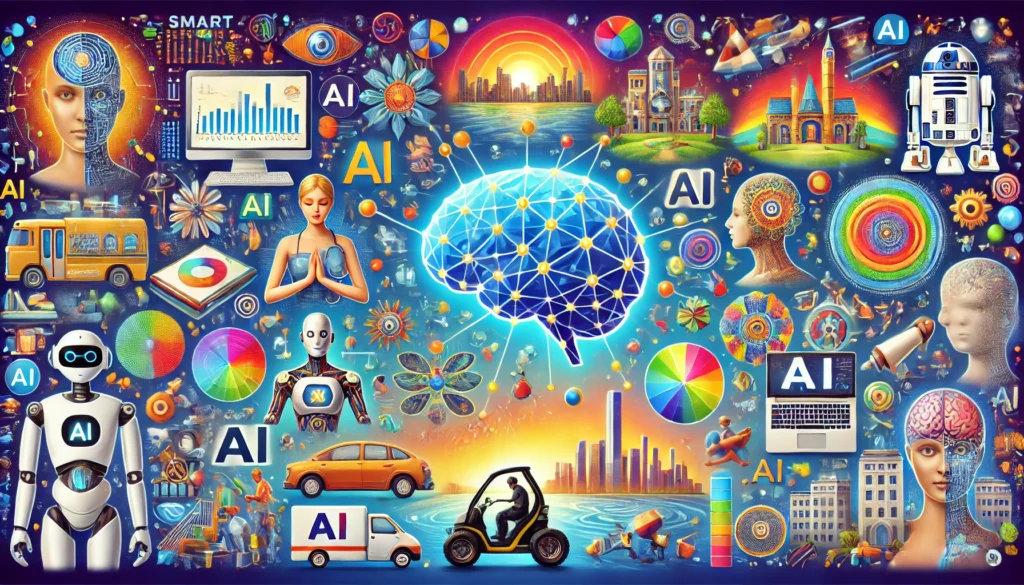
Artificial Intelligence: Transforming Our World and Shaping the Future
Imagine a world where machines not only assist with everyday tasks but also drive innovations in medicine, tackle climate challenges, and enhance human creativity. This isn’t just a futuristic dream; it’s the reality that artificial intelligence (AI) is creating today. Let’s dive into the wonders of AI, from its capabilities to its impact on our lives and the future of technology.
—
What is Artificial Intelligence?
Artificial Intelligence refers to the capability of machines to mimic human-like intelligence. Through complex algorithms, AI enables computers to learn from data, recognize patterns, and make decisions. Unlike traditional programming, where a specific set of instructions is followed, AI has the potential to evolve, adapt, and improve through experience, much like humans.
AI can be categorized into different levels:
1. Narrow AI – This type of AI is specialized and performs specific tasks, like virtual assistants (Siri, Alexa) or recommendation engines.
2. General AI – Envisioned as human-level intelligence, general AI would be able to perform any intellectual task that a human can, though this remains largely theoretical.
3. Superintelligent AI – A hypothetical stage where AI surpasses human intelligence in all fields, from scientific discoveries to social intelligence. It raises philosophical questions about the future of humanity.
—
How AI is Shaping Everyday Life
AI is not just in science labs; it’s transforming industries and enhancing daily life in incredible ways:
1. Healthcare Revolution
AI-powered diagnostics are improving the accuracy of disease detection, from cancer to heart conditions, helping doctors make life-saving decisions faster. AI-driven drug discovery is shortening the time it takes to develop new treatments, with predictive models assisting in faster, more efficient clinical trials.
2. Smart Cities and Sustainability
By optimizing energy usage, reducing traffic congestion, and managing waste, AI is helping cities become more sustainable. Autonomous vehicles are an example, reducing carbon emissions and enhancing road safety, while AI-enabled systems in waste management help improve recycling and minimize waste.
3. Enhancing Education
AI tools are personalizing education, making learning more accessible and engaging. From virtual tutors that offer instant feedback to AI-assisted classrooms that adapt to students’ unique needs, AI empowers educators and supports students at every learning level.
4. Creative Industry Boost
In art, music, and entertainment, AI is opening up new possibilities. Algorithms can now compose music, generate artwork, and even write stories, creating incredible synergies between human creativity and AI innovation. For creators, AI offers new tools to explore, refine, and redefine the boundaries of their work.
5. Enhanced Customer Experiences
AI chatbots, recommendation systems, and personalized marketing have reshaped how businesses interact with customers. Whether you’re shopping online, booking a vacation, or just looking for a good movie, AI tailors the experience to your preferences, enhancing satisfaction and convenience.
—
The Future Potential of AI
The future of AI holds boundless potential, with breakthroughs that could redefine industries and improve global standards of living:
1. AI in Space Exploration – AI-powered robots and data analysis tools will soon assist in exploring planets, searching for extraterrestrial life, and understanding the universe in ways we never imagined.
2. Revolutionizing Medicine with Personalized Treatments – With AI, the future of healthcare is looking toward individualized treatments based on genetic and lifestyle factors, promising more effective and tailored solutions for every patient.
3. Climate and Environmental Solutions – AI can help predict natural disasters, model climate change impacts, and create sustainable technologies, playing a critical role in addressing the global climate crisis.
—
Ethical Considerations and Challenges
Despite its promise, AI brings ethical concerns. Issues around privacy, job displacement, and biases in algorithms are important to address. Ensuring transparent and responsible AI development is crucial to creating a future where AI serves humanity’s best interests.
Governments, companies, and researchers worldwide are working to create ethical guidelines for AI, aiming to build systems that are fair, transparent, and beneficial for society. Future generations of AI specialists, policymakers, and users will play a key role in shaping an inclusive, ethical AI-driven world.
—
Conclusion: Embracing the AI-Driven Future
Artificial Intelligence is more than just cutting-edge technology; it’s a movement reshaping our world. As we stand on the threshold of an AI-powered future, it’s essential to embrace the opportunities it brings while being mindful of its challenges. For students, professionals, and enthusiasts alike, AI offers an incredible field of study and exploration, promising careers that could shape humanity’s future.
Artificial Intelligence invites us to dream big, think responsibly, and work toward a better, more intelligent world. Whether you’re an aspiring AI engineer or simply a curious observer, this journey into the world of artificial intelligence is one of the most exciting explorations of our time.